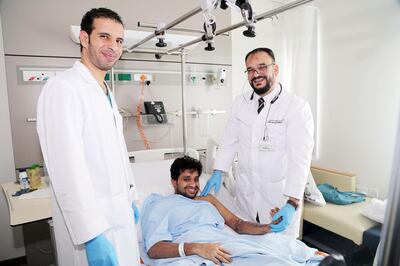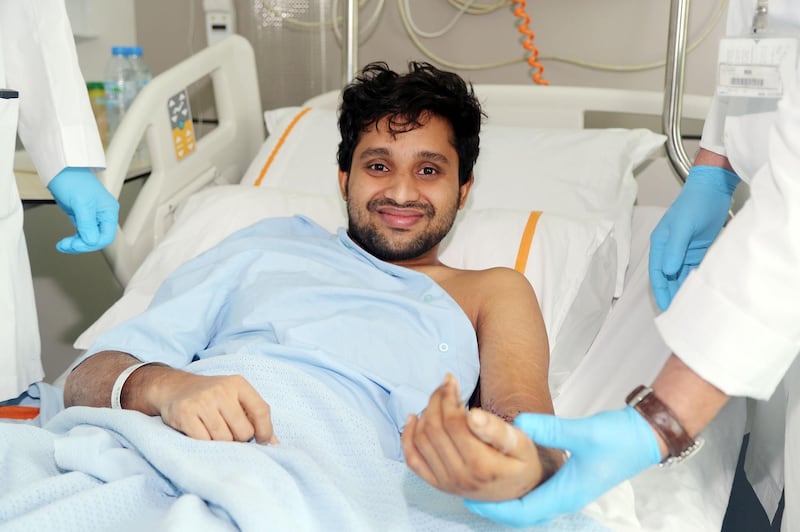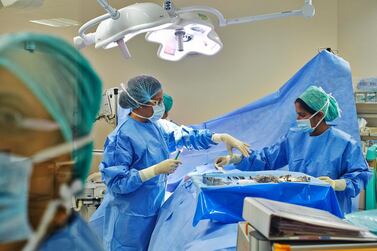Surgeons have reattached the severed arm of Dubai worker involved in freak elevator accident during maintenance work. The man, who faces a year of rehabilitation, underwent a nine-hour operation.
Flertin Baby, 33, from Kerala in India, was working on an elevator in a Dubai hotel when a cable snapped in a freak accident, severing his forearm just below the elbow.
Mr Baby's arm fell through the elevator shaft from the 26th floor to the fifth floor where it was recovered by quick-thinking colleagues.
The mechanic was immediately admitted to hospital on September 28 for emergency surgery.
Although he is thought to have suffered extensive nerve and muscle damage and lost two litres of blood, doctors are confident Mr Baby should eventually recover mobility in his left arm.
“Mr Baby’s forearm survived and he will start an intensive rehabilitation programme in 10 days. He is very lucky,” said Dr Hamed Badawi, consultant hand surgeon at Rashid Hospital.
“He is a on a long journey and his progress will be closely monitored.
“All the nerves were cut so have had to be reconnected, this will take some time to recover good function.”
Doctors said the level of amputation was not unusual, with one case reported every month at Rashid Hospital.
"We can get one or two cases of finger amputations a week," said Dr Khalid Alawadi, head of hand and microsurgery at Rashid Hospital.
"Mr Baby lost a lot of blood from the accident, so also needed an emergency transfusion."
A medical team of seven doctors, surgeons and nurses worked around the clock to reattach the limb after Mr Baby was admitted at around 6.30pm.

“The response by the hand unit and the hospital’s crisis management unit worked very well,” said Dr Badawi.
“This is the only centre capable of working on these difficult cases.
The quick response has enabled a good prognosis for the patient.
“I believe the cable wrapped around the man’s arm and completely severed it.
“The way the arm was protected was very important.”
Mr Baby’s colleagues recovered his arm from the fifth floor of the hotel before cleaning it of dust and dirt and then wrapping it in material.
A male nurse on site helped deliver emergency first aid to stem the flow of blood.
Ambulance staff then placed the arm into a plastic bag and ice to preserve it and give surgeons the best chance of reattaching it.
A crash team of doctors from the hospital’s Hand and Microsurgery Unit were awaiting Mr Baby’s arrival. They included hand and microsurgeon Dr Khalid Alawadi and specialist orthopaedic surgeon Dr Mohammad Ali.
Medics immediately repaired the main artery in his arm restoring blood flow, with the severed bone attached using metal plates and screws.
Surgeons then got to work repairing damaged radial and ulnar nerves running down Mr Baby’s forearm.
Since the intricate operation was completed, feeling and sensation is slowly beginning to return.
He is now out of Rashid Hospital and recovering at home with his wife, Rose.
Chilling a severed body part as soon as possible after it has become detached is crucial to preserving tissue.
This "cold ischemia" helps maintain the damaged tissue once blood supply is cut off.
“Limbs should be cleaned and wrapped in gauze or fabric as soon as possible after an accident like this,” Dr Badawi said.
“The limb must not be allowed to dry-out. It should be wrapped and placed in a plastic bag and an ice box as soon as possible.
“This will give the patient the best chance of recovery.
“No one can do this kind of recovery alone, teamwork is vital.”







